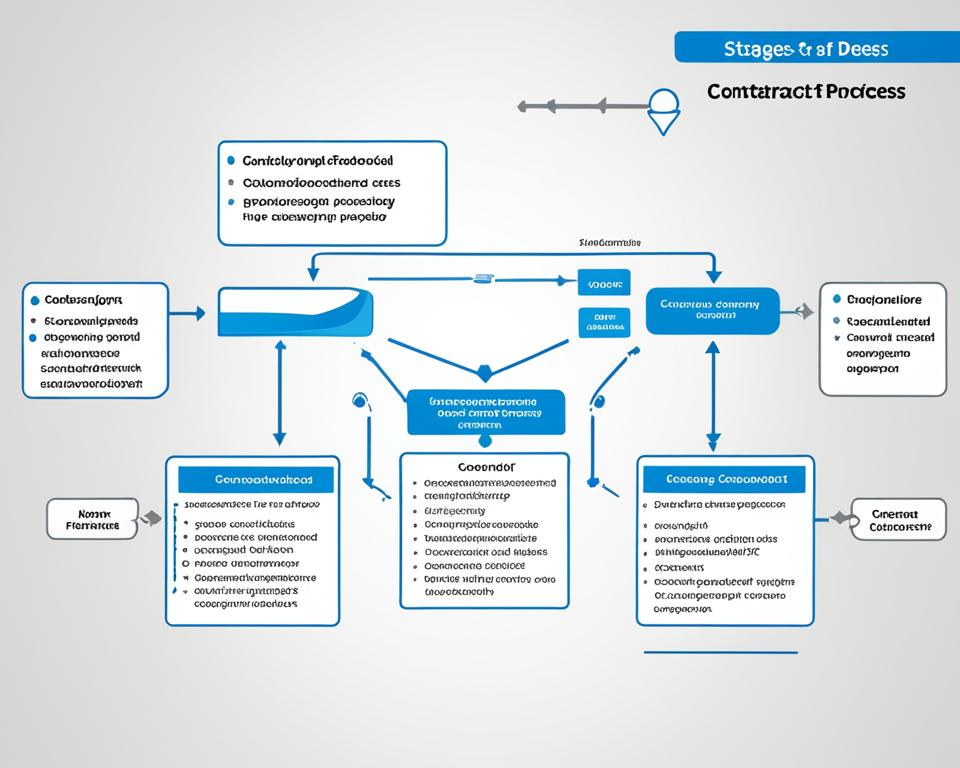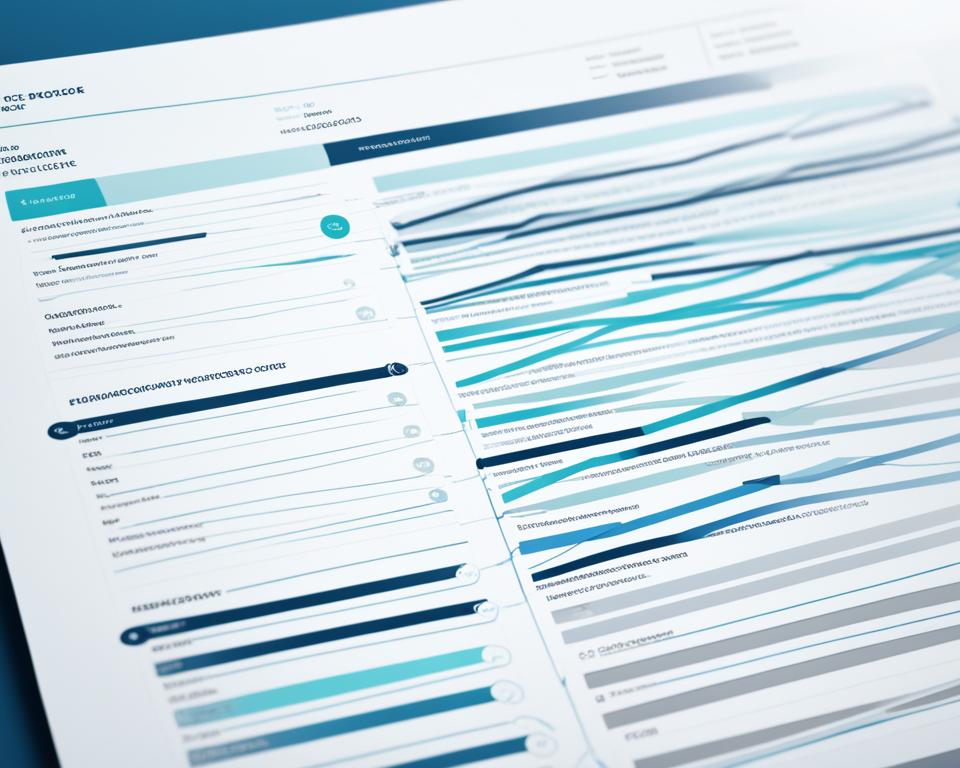Have you ever thought about how your organization could run smoother with better contract management? SAP MCF is a game-changer in this area. It’s all about making contract management more efficient and effective. This tool is crucial for today’s fast-moving businesses.
With SAP MCF, companies can manage contracts better and make more money. It helps with following the rules and making sure everything runs smoothly. By using SAP MCF, businesses can make the most out of their contracts.
Key Takeaways
- SAP MCF enhances contract lifecycle management for greater efficiency.
- Effective contract management contributes to revenue optimization and compliance.
- Streamlining contract management can significantly reduce organizational risks.
- Integration of SAP MCF is essential for modern enterprise contract management.
- Understanding the nuances of contract management is key to leveraging SAP MCF successfully.
Understanding Contract Lifecycle Management
Contract lifecycle management (CLM) is about managing every part of a contract, from start to end. It makes sure companies can handle contracts well, improving work and money outcomes. Knowing why contract management is key is vital. It lowers risks, follows rules better, and makes work smoother.
Definition and Importance
CLM focuses on creation, execution, and analysis of contracts. A good contract management plan helps spot and fix risks from bad deals or not following rules. It’s important because it helps control contracts, builds better client and vendor relationships, and solves disputes fast. This reduces the risk of losing money.
Key Stages in the Contract Lifecycle
There are key stages in managing contracts that companies must go through:
- Initiation: Find out if a contract is needed and collect important papers.
- Negotiation: Talk about terms to make a contract everyone agrees with.
- Execution: Sign the contract to make it legally binding.
- Performance Monitoring: Check if the contract is being followed and how well it’s doing.
- Renewal: See if the contract is working well and decide if to renew or end it.
| Stage | Description | Importance |
|---|---|---|
| Initiation | Determining the necessity of the contract and gathering information. | Sets the groundwork for successful contract engagement. |
| Negotiation | Aligning interests and finalizing terms. | Ensures all parties agree on obligations and benefits. |
| Execution | Formal signing of the contract. | Legitimizes the agreement and initiates obligations. |
| Performance Monitoring | Tracking compliance with contract terms. | Helps ensure all parties fulfill their responsibilities. |
| Renewal | Assessing and deciding on contract continuation. | Facilitates ongoing relationships and potential benefits. |
The Role of SAP MCF in Contract Management
Let’s dive into how SAP MCF helps with contract management. It has many parts and abilities. SAP MCF is key for companies wanting to make their contract processes smoother. It offers automation, real-time teamwork, and analytics, making it a top choice for managing contracts.
Overview of SAP MCF Features
SAP MCF has many features:
- Automation: It cuts down on manual work, lowers mistakes, and boosts efficiency.
- Real-time Collaboration: It lets people work together smoothly from anywhere.
- Analytics Capabilities: It gives insights on how contracts are doing and trends for better choices.
- Centralized Repository: It keeps all contracts in one spot, making them easier to find and manage.
- Compliance Tracking: It helps make sure contracts follow the law and company rules at every step.
Benefits of Integrating SAP MCF
Using SAP MCF brings big advantages. Here are some:
- Cost Reduction: Making processes smoother and cutting down on time spent on contracts saves money.
- Transparency: It gives everyone clear views of contract details and how they’re doing.
- Improved Compliance: It helps keep an eye on and stick to legal rules.
In short, SAP MCF’s features greatly improve contract management. By adding these tools, companies can see big benefits. This leads to better and more effective ways of handling contracts.
Contract Negotiation Made Easy with SAP MCF
Effective contract negotiation is key to strong business relationships. SAP MCF tools make this process smoother by offering structured ways to manage and talk during negotiations. I’ll show how these tools bring more clarity, organization, and efficiency to the negotiation stages.
Streamlining the Negotiation Process
SAP MCF gives users tools for smooth communication among parties. It uses standardized templates and keeps all documents in one place. This makes tracking changes easy. Version control ensures everyone works with the newest contract drafts.
This approach boosts transparency and cuts down on misunderstandings.
Best Practices for Effective Negotiation
Using smart negotiation strategies can greatly improve results. Here are some tips I find useful:
- Prepare Thoroughly: Know what everyone wants.
- Be Clear on Terms: Make sure terms are clear to avoid confusion.
- Utilize SAP MCF Tools: Use SAP MCF’s tools to keep track of changes and stay organized.
By combining these strategies with SAP MCF, I’ve seen big improvements in how fast and well contracts are negotiated.
Enhancing Contract Approval Workflow
Improving the contract approval workflow is key to making any organization more efficient. It’s important to understand the steps involved in contract approval. Delays in getting approvals can cause big problems, slowing down important work and wasting resources. By recognizing these issues, we can find ways to fix them.
Understanding Approval Processes
For a smooth contract approval workflow, a few things are crucial. These include clear roles for everyone involved and set timelines for each step. Knowing where things get stuck helps us find ways to make approvals faster and more reliable. Understanding these workflows is the first step to making them better.
How SAP MCF Optimizes Approvals
SAP MCF is a great tool for making approval processes better. It automates reminders and lets you set up different approval paths. This means faster communication among team members, helping projects stay on track and contracts get done quickly. Using technology like this can really help optimize approval processes for better performance.

Using SAP MCF makes the contract approval process smoother and boosts strategic procurement efforts. For more info on how these tools help with procurement efficiency, check out SAP Ariba.
Ensuring Contract Compliance
Today, it’s key to focus on contract compliance in business. Not following contracts can lead to big legal and financial problems. This can hurt a company’s good name. Knowing how to stick to contracts helps protect a business and keep good relationships with others.
Importance of Compliance in Contract Management
Being compliant with contracts is key to managing them well. It makes sure everyone does their part, reducing the risk of breaking contracts. Not following contracts can cause big issues, like:
- Legal consequences such as fines and lawsuits.
- Financial losses from penalties or not meeting contracts.
- Damaged reputation that can hurt future business chances.
It’s important for companies to keep an eye on compliance. This helps them work well and make sure they meet all contract rules.
Tools for Monitoring Compliance within SAP MCF
SAP MCF compliance tools are great for keeping an eye on compliance. They help businesses track if they’re following contract rules. Some main features are:
| Compliance Tool | Description |
|---|---|
| Alerts | Automated notifications for deadlines or when something’s off. |
| Audits | Regular checks to see if you’re following the rules. |
| Compliance Checklists | Lists that make sure you’re doing everything you should. |
Using these SAP MCF tools makes it easier for companies to keep up with contract compliance. This leads to smoother operations and less risk.
Leveraging Contract Analytics
Today, contract analytics is key for making operations more efficient and driving strategy. By using data, companies can check how well their contracts are doing. They can spot trends that might be missed otherwise. This helps businesses manage their agreements better.
What Are Contract Analytics?
Contract analytics means getting insights from contract data to make better decisions and improve operations. It uses different methods to look at contract terms, follow rules, and check how well contracts are doing. By analyzing this data, companies get a better grasp of what their contracts mean and how they affect their business plans. This leads to better processes and stronger negotiations.
Utilizing Data for Informed Decisions
Companies use contract analytics to keep an eye on important performance signs and standards for their contracts. This helps in making smart choices by showing how well things are going and where they can get better. Here’s a table with some common signs to watch:
| KPI | Description | Importance |
|---|---|---|
| Contract Cycle Time | The time taken from contract creation to execution. | Understanding delays can identify inefficiencies. |
| Compliance Rate | Percentage of contracts adhering to agreed terms. | High compliance rates reduce legal risks. |
| Value Leakage | Lost potential revenue due to mismanaged contracts. | Minimizing leakage maximizes profitability. |
| Renewal Rates | Proportion of contracts renewed on schedule. | A critical metric for gauging client satisfaction and retention. |

By keeping an eye on these metrics, companies can improve their contract management. This leads to better business results.
Supplier Contract Management with SAP MCF
In today’s competitive world, managing supplier contracts is tough. Issues like communication problems, compliance risks, and hard performance checks are common. It’s key for businesses to tackle these to keep operations smooth and build strong supplier ties.
Challenges in Supplier Contracts
Managing supplier contracts is tricky because of a few big hurdles:
- Communication barriers: Misunderstandings can lead to conflicts and slow things down.
- Compliance risks: It’s vital to follow all rules and terms, but it can be hard.
- Performance evaluation: Without good tracking, checking how suppliers do their job is tough and not always fair.
How SAP MCF Addresses Supplier Management
SAP MCF supplier solutions really help with these issues. This system keeps all data in one place, making communication clear and open. It also makes tracking performance easy with analytics, helping make better choices. For more on how SAP Ariba improves procurement and supplier management, check out this guide on SAP Ariba.
Enterprise Contract Management Solutions
The modern business world is getting more complex. It needs efficient and detailed strategies. Having a strong contract management plan is key for staying agile and competitive. Good contract management solutions help businesses quickly adapt to market changes.
Why Enterprises Need Robust Contract Management
There are several reasons why strong contract management is needed:
- Scalability: As companies get bigger, handling more contracts becomes hard without a good system.
- Security: Keeping contract data safe is crucial in today’s world. Strong systems make sure you follow the law.
- User Accessibility: A simple interface lets team members from different departments easily find contract info. This helps with teamwork and efficiency.
Integrating SAP MCF with Enterprise Systems
Adding SAP MCF to current systems boosts contract management. This method offers:
- Centralized Data Management: SAP MCF brings contract info together, making it easier to access and keeping data correct.
- Improved Workflow Automation: Automating simple tasks cuts down the time spent on contract management.
- Enhanced Reporting and Analytics: Integration lets you use advanced analytics. This helps businesses make better decisions with contract data.

Creating a Master Contract Framework
In today’s fast-paced business world, creating a master contract framework is key for managing many contracts well. It makes sure all contracts follow company policies and stay in line with the law. This approach helps with better efficiency, less risk, and stronger negotiation positions.
What is the Master Contract Framework?
A master contract framework is a central spot for all contract documents and their clauses. It makes managing contracts easier by keeping things consistent across different agreements. With this framework, companies can make their contract process smoother. It ensures each contract meets the company’s goals and follows the law.
Implementing MCF in Your Organization
To use the benefits of a master contract framework, you need to implement SAP MCF. This starts with looking at how you manage contracts now and finding ways to get better. Here are the main steps to put the master contract framework into action:
- Define Objectives: Set clear reasons why you need a master contract framework, focusing on making things more efficient and following the law.
- Assess Current Processes: Look at how you manage contracts now to find areas that need work and chances to do better.
- Utilize Technology: Use SAP MCF’s tools to make workflows smoother and fit better with what you already use.
- Train Stakeholders: Teach team members about the tools and steps involved.
- Monitor and Optimize: Keep checking how well the framework works and make changes based on feedback and results.
By following these steps, companies can handle contract management better. The mix of creating a master contract framework and using SAP MCF boosts efficiency and gives teams the data they need for smart decisions. For more on using data in contract management, check out Ariba Reporting and Analytics.
| Step | Description |
|---|---|
| Define Objectives | Setting clear goals for making contract management more efficient and following the law. |
| Assess Current Processes | Looking at what you do now to find areas that need improvement and chances to do better. |
| Utilize Technology | Using SAP MCF to automate and connect with what you already use. |
| Train Stakeholders | Teaching the team about the tools and steps they need to know. |
| Monitor and Optimize | Checking how well the framework is working and making changes as needed. |
Streamlining the Contract Drafting Process
Efficient contract drafting is key to successful projects and managing risks. SAP MCF drafting tools make this process better by offering many features. These tools help create contracts that are clear and complete, reducing the chance of misunderstandings.
Tools and Templates Available in SAP MCF
SAP MCF has many tools and templates for contract drafting. These include:
- Predefined templates for different contract types
- Checks for legal compliance
- Features for working together with others
- Automated libraries of clauses for consistency
Using these tools from SAP MCF makes drafting contracts faster and keeps them in line with best practices. This method helps me keep high standards and avoid mistakes.
Best Practices for Efficient Drafting
To get the most from SAP MCF tools, I focus on best practices for drafting contracts. These include:
- Understanding the contract’s purpose and scope first
- Working with important people early
- Writing in clear language
- Reviewing and getting feedback to ensure everything is clear
- Keeping templates updated for new laws or needs
Following these practices helps me make contracts that meet our goals and build good relationships with suppliers. For more on tools for efficient procurement, check out how SAP MCF works with other platforms. This can make the contract drafting process better, leading to improved procurement results, as seen in this resource.

| Tool | Description | Benefit |
|---|---|---|
| Clause Library | Pre-approved clauses for common contract types | Ensures consistency and compliance |
| Collaboration Features | Real-time input from teams | Improves accuracy and speed of drafting |
| Compliance Checker | Automated checks against legal standards | Reduces risk of legal issues |
| Template Builder | Customizable contract templates | Saves time and maintains uniformity |
Digital Transformation in Contract Management
In today’s fast-paced business world, embracing digital transformation in contract management is key. This change comes from using automation in contracts. It makes processes smoother, cuts down on delays, and lowers mistakes. This can greatly improve how efficient and effective a company is.
The Role of Automation in Contract Management
Automation is a big part of making contract management modern. It helps automate simple tasks, making work flow better. This means contracts get approved and checked faster, helping businesses move quicker.
Automated systems speed up processes and offer detailed tracking. This means you get updates in real-time and can see how contracts are doing. It’s a big win for businesses looking to stay ahead.
Benefits of Going Digital
Going digital with contract management brings more than just speed. It leads to:
- Lower costs from less manual work.
- Better tracking and alerts for following rules.
- Improved teamwork and talking among everyone involved.
- Stronger analytics and reports for making smart choices.
For example, tools like Ariba Supplier Collaboration make working with suppliers easier and improve getting goods and services. This shows how digital transformation in contract management and automation work together. It’s clear that moving to automation in contracts is a must for staying ahead in the market.
Integrating Third-party Solutions with SAP MCF
Integrating third-party solutions with SAP MCF boosts contract management. It helps organizations work more efficiently. By using outside apps, I can make workflows better and manage contracts smoothly.
Possible Integrations to Enhance Functionality
Many third-party solutions can improve SAP MCF. These include document management systems and advanced analytics tools. Some key integrations are:
- Cloud-based Document Management Systems: Makes storing and finding contract documents easier.
- e-signature Platforms: Speeds up signing contracts, cutting down on time.
- Analytics Tools: Gives deeper insights into how contracts are doing and if they follow the rules.
- CRM Solutions: Keeps sales and contract data in line for better customer handling.
Ensuring Compatibility with Existing Systems
It’s key to make sure new integrations work with what’s already there. Before adding new systems, I look at our current setup to spot any issues. Here are some tips for successful integrations:
- Data Synchronization: Makes sure info moves smoothly between systems.
- API Availability: Helps with real-time data sharing.
- Customization Options: Lets us adjust integrations to fit our needs.
- Testing and Validation: Checks that everything works together well before we start.

These steps can make SAP MCF work better, letting organizations use third-party solutions for better contract management.
| Integration Type | Functionality Enhanced | Benefits |
|---|---|---|
| Cloud-based Document Management | Storage and Retrieval | Improved access and organization of documents |
| e-signature Platforms | Contract Execution | Accelerated contract finalization |
| Analytics Tools | Performance Insights | Data-driven decision making |
| CRM Solutions | Customer Management | Consolidated view of sales and contracts |
Real-world Case Studies of SAP MCF Implementation
In this section, we’ll look at real SAP MCF case studies. These show how this tool helps with contract management. We’ll see how different companies have used SAP MCF and the great results they got.
Success Stories from Various Industries
Many companies have told us how SAP MCF has helped them manage contracts better. For example:
- A global pharmaceutical company cut their contract processing time by 30%. This made their work flow much smoother.
- A leading technology firm improved teamwork, which led to a 95% contract compliance rate.
- A major retail corporation saved a lot of money by getting better at negotiating with suppliers, thanks to SAP MCF analytics.
Lessons Learned from Implementations
Looking at these SAP MCF case studies, we can learn important lessons for future projects:
- It’s key to get everyone involved for a smooth start and use of the system.
- Training should be thorough and ongoing to keep the team up to speed on new features.
- Checking the contract management process often helps spot areas to improve.
Future Trends in Contract Management
Looking ahead, contract management is changing fast thanks to new technologies. These changes aim to make processes smoother, improve following rules, and help companies move quickly. Knowing about these trends will help businesses stay ahead in a changing market.
Emerging Technologies Impacting Contract Management
Several important technologies are leading this change, including:
- Artificial Intelligence (AI): AI can do routine tasks, check contract details, and help with following rules.
- Machine Learning: This tech gets better over time, helping make decisions and spot potential risks.
- Blockchain: Blockchain makes contracts safe and open, cutting down on fraud and building trust.
These emerging technologies in contracts speed up contract management. They also make working together and using data more effective.
The Future of SAP MCF and Contract Management
The SAP MCF future outlook looks bright as companies add these new tech to their contract management. Using AI and machine learning makes creating and managing contracts more efficient. Cloud solutions also make it easier to share data, which helps teams work better together.
As we move forward, looking at real examples can help us make better choices. For example, companies using SAP Ariba have saved money and gotten more efficient. For more details on how these modern solutions work, check out this overview of case studies.
Training and Support for SAP MCF Users
To get the most out of SAP MCF, users need good training and support. There are many tools and platforms to help learn SAP MCF. These resources make it easier for users to understand how to use it and get better at it.
Resources Available for Learning SAP MCF
There are many SAP MCF training resources for different learning styles. Here are some options:
- Online Courses: These courses give a full overview of SAP MCF and how it works.
- Webinars: Webinars happen often and cover specific features and the latest news.
- User Communities: Joining forums and groups lets users share knowledge and solve problems together.
- Official Documentation: SAP’s detailed documentation is a great resource for users.
Getting Help with SAP MCF
Support for SAP MCF users is just as important. It’s important to know where to get help quickly. Here are some key support options:
| Support Options | Description |
|---|---|
| Help Desk | A help desk is set up for users to ask about technical problems or questions. |
| Community Forums | Forums are active places for discussions and help from other users on common issues. |
| Consulting Services | Professional consulting services offer specific support and projects for business needs. |
Having these SAP MCF training resources and support options is crucial for a better user experience. For more info on SAP and its features, check out this resource.
Conclusion
As we wrap up our look at SAP MCF, it’s clear this tool is key for managing contracts in any business. It offers many features that make handling contracts easier and more efficient. SAP MCF helps with contract negotiations, makes sure of compliance, and streamlines approval processes.
Using data analytics and connecting with current systems is also crucial. These tools help make processes smoother and help businesses make smart choices. This way, SAP MCF is setting the stage for the future of contract management, giving companies the tools to handle contracts with ease.
In today’s fast-changing business world, it’s vital for companies to look into new solutions like SAP MCF. By using this technology, they can stay ahead and adapt to new challenges. It’s a smart move for staying competitive and flexible in the market.
FAQ
What is SAP MCF?
SAP MCF stands for Master Contract Framework. It’s a solution that makes managing contracts easier for companies. It helps with managing the contract lifecycle, ensuring contracts follow the rules, and handling supplier contracts.
How does contract lifecycle management improve efficiency?
Contract lifecycle management makes the process from start to end smoother. It lowers risks, keeps things in line with rules, and boosts efficiency. This is done by keeping track of contracts well.
What are the benefits of using SAP MCF?
SAP MCF brings many advantages like cutting costs, making things clearer, and tracking compliance better. It also improves analytics for better decision-making in contract talks and approvals.
How can SAP MCF help with contract negotiation?
SAP MCF helps with contract negotiation by offering tools like templates and real-time communication. These tools make negotiations clear and follow best practices.
What tools does SAP MCF offer for contract compliance?
SAP MCF has tools like alerts and audit trails for keeping an eye on compliance. These help companies stick to contract rules and avoid breaking them.
What role do contract analytics play in management?
Contract analytics help gather and analyze contract data. This reveals trends, checks performance, and guides strategies for future negotiations and contract terms.
How can I implement a Master Contract Framework in my organization?
To use a Master Contract Framework with SAP MCF, start by making contract processes standard. Make sure everyone knows what to do. Then, use SAP MCF tools to make all contracts consistent.
What challenges might arise in supplier contract management?
Challenges in managing supplier contracts include communication issues, compliance risks, and hard performance checks. SAP MCF helps by managing data well and making communication smooth.
How does SAP MCF integrate with existing enterprise systems?
SAP MCF works well with other systems in a company. It makes managing contracts better by keeping data consistent and improving user experience across different apps.
What training resources are available for SAP MCF users?
SAP MCF users can find training through webinars, online guides, and forums. These resources help users get better at using the software.


